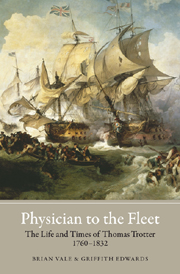Book contents
- Frontmatter
- Contents
- List of Illustrations
- List of Abbreviations
- Foreword
- Preface
- Background
- From Surgeon's Mate to Physician to the Fleet
- 3 HMS Berwick
- 4 Surgeon of a Slaver
- 5 Northumbrian Interlude
- 6 Recalled to the Colours
- 7 The Royal Hospital, Haslar
- 8 Physician to the Channel Fleet
- 9 The Conquest of Scurvy
- 10 Shore-Based in Plymouth
- 11 Honours and Half-Pay
- The Newcastle Years
- Bibliography
- Index
4 - Surgeon of a Slaver
from From Surgeon's Mate to Physician to the Fleet
Published online by Cambridge University Press: 12 September 2012
- Frontmatter
- Contents
- List of Illustrations
- List of Abbreviations
- Foreword
- Preface
- Background
- From Surgeon's Mate to Physician to the Fleet
- 3 HMS Berwick
- 4 Surgeon of a Slaver
- 5 Northumbrian Interlude
- 6 Recalled to the Colours
- 7 The Royal Hospital, Haslar
- 8 Physician to the Channel Fleet
- 9 The Conquest of Scurvy
- 10 Shore-Based in Plymouth
- 11 Honours and Half-Pay
- The Newcastle Years
- Bibliography
- Index
Summary
Slavery and the triangular trade
FOR A NAVAL SURGEON to find himself demobilized on the banks of the Mersey was no bad thing. Liverpool was at this time one of Britain's major trading ports. At the beginning of the century, the wealth of London and Bristol had given the merchants of those cities a virtual monopoly over foreign commerce, but within fifty years the pushy upstarts of Liverpool, who cut their costs and paid their captains and agents a fraction of the going rates, had overtaken them. When Trotter began to look for a berth in 1783, three hundred ships were being cleared for foreign trade. And of these, over a quarter were Guineamen – that is, vessels designed to carry slaves from Africa to the booming markets of the Caribbean. For just as Liverpool had become Britain's principal port for overseas commerce, so it had come to dominate the slave trade.
Slavery had been a widely accepted practice since ancient times and had been an integral part of African societies since well before the arrival of the Europeans. Not only was internal slavery common, but slaves had also been an export commodity and part of Africa's trade with the Arab world, where they had been employed as servants, soldiers and in the fields. The development of the plantation-style agriculture in the Americas and the Caribbean in the seventeenth century had, however, stimulated the practice and changed its fundamentals.
- Type
- Chapter
- Information
- Physician to the FleetThe Life and Times of Thomas Trotter, 1760–1832, pp. 48 - 68Publisher: Boydell & BrewerPrint publication year: 2011



